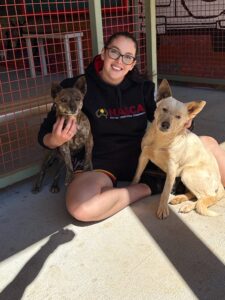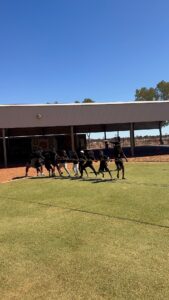Maddison “Maddy” Mangan is Stockwells’ Marketing and ESG Coordinator. She recently volunteered with NASCA in Epenarra Wutunugurra in the Northern Territory for the second year in a row.
NASCA partners with remote schools and sends teams for week-long visits during the year. Volunteers support classroom learning as well as sport, health, mentoring and personal development. The goal is stronger attendance, better attitudes to learning and practical life skills.
Maddy’s week included morning engagement runs in the school troopy, community BBQs, breakfast with students and a mix of class and sport.
When Maddy put her hand up, we backed her and cleared her calendar to cheer her on. We got to sit down with Maddy to chat about her experience in her own words, alongside reflections from NASCA’s program director, Blake Borgia.
Q: How did you first connect with NASCA?
Maddy: I first heard about NASCA about three years ago. A friend I met travelling had done the trip and called it ‘life-changing.’ Last year she messaged to say volunteers had dropped out and asked if I could join. It was a three-week turnaround – and then I headed out there.
Q: Where did you go and what’s it like?
Maddy: Last year I went to Canteen Creek, about six and a half hours north-east of Alice Springs – extremely remote and isolated. This year I went to Epenarra, about 45 minutes away from Canteen Creek, with similar challenges around isolation.
Q: What does a typical day look like participating in the program?
Maddy: Mornings start with student engagement. You jump in the school’s troopy and drive to the kids’ houses, beeping the horn and calling out, ‘It’s school time – come get breakfast.’ Slowly the kids arrive. Schools provide breakfast, morning tea and a warm lunch.
Blake: Volunteers support our mission by providing our young people with exposure to people from all different walks of life. People from different backgrounds, people with different career paths and people with different experiences. It also enables us to highlight the many different paths after high school.
Q: How does NASCA work with schools and teachers?
Maddy: Schools are independent. NASCA builds relationships with remote schools and visits in week-long blocks through the term, working alongside teachers. Engagement is the big focus, getting kids excited to come to school. Attendance usually lifts the week before, and for a couple of weeks after, then tapers off.
Blake: We provide the young people we work with all the tools to create their own futures. Through ongoing and consistent support and the connection to culture, we aim to provide our young people with every opportunity to have a successful future in whatever journey they choose.
Q: What cultural realities shape schooling in community?
Maddy: Some boys go through ceremony to become men around 14, and it can be hard to keep them in school after that. If there’s a death, families observe sorry business and can be away for weeks. Kids are often enrolled in multiple schools, up to about 12, so when families move, they can step straight into class in the next community.
Q: A standout moment you’ll never forget?
Maddy: On the first day a little girl, Liana, ran up, held out her pinky and looked up at me. I asked, ‘What are we pinky promising?’ She said, ‘To be friends.’ It was so simple and melted my heart. Kids can be so open and loving and it doesn’t matter where you come from.
Q: What hard realities did you witness?
Maddy: The lack of clean drinking water really affected me again. Many adults and children have chronic ear infections and deafness, kidney issues, things that could be avoided with clean water. Addressing that would be simple and would reduce so much harm.
Q: How does media coverage compare to what you saw?
Maddy: The way Alice Springs is portrayed on the news felt completely different to what I experienced. I never felt unsafe. Everyone was lovely. I’d love to see more of the beauty highlighted, more stories people would want to see and hear.
Q: What’s one thing NASCA wishes more people understood about the challenges Indigenous young people face today?
Blake: There is so much in there, but I think understanding that Aboriginal people still face significant and ongoing issues from the impact of colonisation – intergenerational trauma, over-representation in the justice system and lowered health outcomes. A lot of our young people have that disconnect from culture, which impacts their identity and self-confidence.
We work in so many regions, and in each area, things are completely different. We design our programs to suit the community, so for us, if something works in one area, it doesn’t necessarily mean it’s going to be the same elsewhere. We listen to the community and try to fit what is needed and works.
Q: Biggest takeaways for you?
Maddy: We think we know what life is like for some Indigenous people, but spending time listening changes you. No one complained. The kids were joyful and proud of their land, culture and community. Despite not having a lot, there was so much pride and gratitude. I came back feeling fulfilled, inspired, grateful and motivated.
Q: How did Stockwells support your trip?
Maddy: Stockwells supports staff who take part in charitable endeavours. They kindly donated the full $1,500 fundraising amount for my trip. Working for a company that prioritises its people and passions is extraordinary. Not many businesses put their money where their mouth is. Some greenwash but Stockwells means it. It’s nice to work for a business that truly supports a cause, not just says they do.
Q: What’s next?
Maddy: We’re exploring work-experience opportunities with NASCA’s Sydney school program.
We’re inspired to find practical ways to help.
Q: If someone is thinking about volunteering, what should they know?
Maddy: I definitely recommend it. It’s free for volunteers, they pay for everything. Once you get to Alice, food and transport are covered. If you’ve ever considered putting your hand up, do it. You won’t regret it.




We’re so proud of Maddy and admirable of the great work NASCA does. A special thanks to Blake Borgia for his contribution to this article.
If you’d like to support this work, explore NASCA to learn about volunteering and donations.